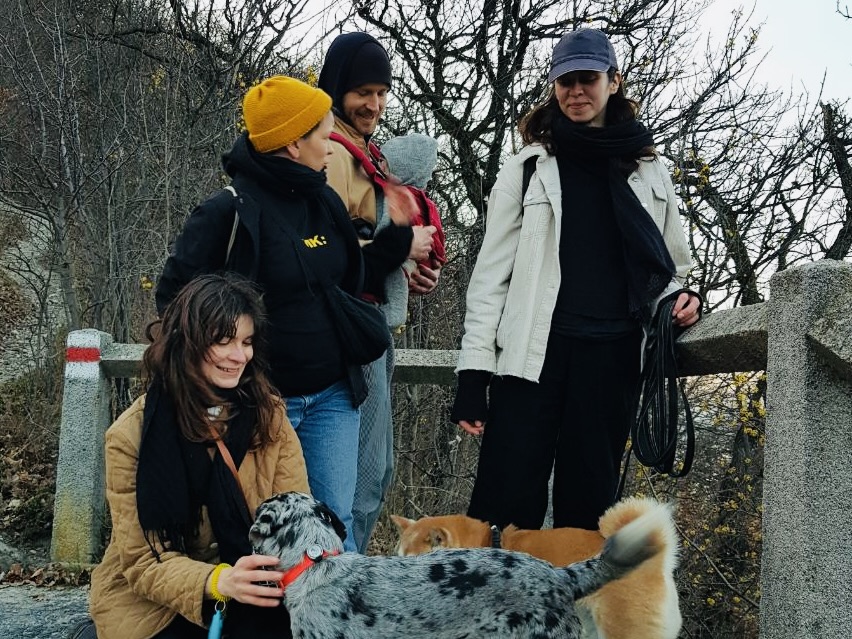In den dunklen Stunden des letzten Winters, nach der Wahl von Trump und den Koalitionsverhandlungen mit Kickl, ging es mir wirklich schlecht. Ich hatte das Gefühl, "die Welt" (also diejenigen, die so anmaßend sind, zu meinen, dass sie diese regieren) hat die Zukunft des Planetens nun willentlich abgeschrieben und wir erleben eine faschistische Endzeit. Um aus dieser Leidenssituation etwas produktives und kraftspendendes zu gewinnen, habe ich begonnen, die Radiosendung "Psychologie der Klimakrise" zu machen, die ab morgen auf Radio Ö1 zu hören sein wird.
Durch meine tollen Gesprächspartner*innen habe ich gelernt, die aktuelle politische Situation als Moment der psychischen Abwehr zu verstehen und - ohne die faschistische Gefahr zu negieren - aus der Krise auch Hoffnung als "politische Haltung", wie es Elin Kelsey sagt, zu gewinnen. Ich hoffe, dass Euch die Sendung auch zumindest ansatzweise so sehr helfen kann wie mir beim machen damals.
Die Sendung läuft in den nächsten Tagen, Di-Do 10.-12.6 auf Radio Österreich 1. Live immer von 9:05-9:30 und von 22:05-22:30. Ihr könnt die Sendung auch ab Erstausstrahlung jederzeit online nachhören und hier als Podcast downloaden.
Hier ein Überblick über die einzelnen Teile:
Teil 1: Die Psyche in der Klimakrise
Obwohl 2019 fast alle europäischen Staaten den Klimanotstand ausgerufen haben, geschieht nach Auffassung vieler Expert:innen viel zu wenig, um die Klimakrise aufzuhalten. Woran liegt das? Leben wir in einer "Verdrängungsgesellschaft" (Tadzio Müller), in der das Funktionieren in unserer Gesellschaft zunehmend auf der Unterdrückung von ökologischem Bewusstsein fußt? Was ist eigentlich climate anxiety und welche messbaren Auswirkungen hat diese Klimaangst für individuelle wie gesellschaftliche Entwicklung? Und wie finden Menschen trotz der beängstigenden Lage Stabilität und Hoffnung?
Das Wissen um die Klimakrise ist in der Mehrheitsgesellschaft angekommen. Doch aus dem Bewusstsein ist bisher vielerorts noch wenig Handlung und Veränderung entsprungen. Lässt sich der "Kollaps" noch verhindern - und wie kann man sich den vorstellen? Wie verarbeiten wir Menschen das Wissen um die globale Klimakrise, wie gehen wir emotional mit der psychischen climate anxiety um und wie wirkt sie sich auf die Gesundheit aus? Was für Ansätze einer Behandlung gibt es? Wie stellen sich Trauerprozesse gegenüber einer verlorenen Zukunftshoffnung bei jungen Menschen dar, welche Verdrängungsmechanismen finden tiefenpsychologisch statt? Wie gehen Menschen mit ihren "Klimagefühlen" um und übersetzen sie in positive Handlungen und Aktivismus?
--> Link zur Sendung
Teil 2: Die Tiefenstrukturen der Verdrängungsgesellschaft
Die menschliche Psyche scheint darauf ausgelegt zu sein, Umweltbelange an den Rand der Aufmerksamkeit zu drängen. Welche Triebfedern wohnen dieser Verdrängungsdynamik inne, welche alternative Positionen in der psychologischen und psychoanalytischen Forschung gibt es, die der "Umwelt" ebenfalls einen zentralen Stellenwert in der Menschwerdung zusprechen? Dieses Menschenbild und seine Setzung von relevanten und irrelevanten Umgebungsinformationen wirkt sich auch auf unser Bild von Gesellschaft aus. Während bisher in der Ökologiebewegung großteils von einem "rationalen Überzeugungsmodell" ausgegangen wurde, wonach Menschen mit genügend Krisenbewusstsein zu vernünftigen Veränderungen bewegt werden können, sieht es gegenwärtig vermehrt nach dem Gegenteil aus. Je mehr Menschen von der Krise wissen, desto eher scheinen sie sich in Frust, Abwehrreaktionen und Verteidigungshaltungen zu verhärten. Wie kann psychische Reife gegenüber der Umwelt und Klimakrise verstanden werden? Und welche Anpassungsmechanismen werden wir in Zukunft brauchen?
Teil 3: Wie kommuniziert man die Klimakrise?
Die aktuelle mediale Kommunikation der Klimakrise scheint an ihre Grenzen zu stoßen - und die mediale Berichterstattung scheint einen gewissen Ermüdungseffekt zu bewirken. In dieser Situation wird die Effizienz von rationalen Argumenten mit dem Zweck einer Verhaltensänderung zunehmend in Zweifel gezogen. Wie können Medien einen positiven Umgang mit der Klimakrise finden und diese so kommunizieren, dass Menschen fähig sind, diese Informationen auch aufzunehmen und zu verarbeiten? Hat die Kommunikationsstrategie des "Verhinderns der Katastrophe" ausgedient in Zeiten, in denen diese Katastrophe in Form von Flutkatastrophen, Waldbränden und Rekordhitzewellen mehr und mehr Bestandteil des menschlichen Alltags wird? Vertreter:innen des Genres "Hopepunks" raten dazu, sich weg von der reinen Negativberichterstattung zu bewegen und sich stattdessen auf gut funktionierende Positivbeispiele zu fokussieren. Wie sähe eine wirksame Kommunikation inmitten des "Kollapses" aus und was für solidarische Praktiken ließen sich mit ihr entwickeln?
--> Link zur Sendung
Ein großer Dank an Alexandra Augustin für ihren großartigen redaktionellen Support beim Machen der Sendung!






















